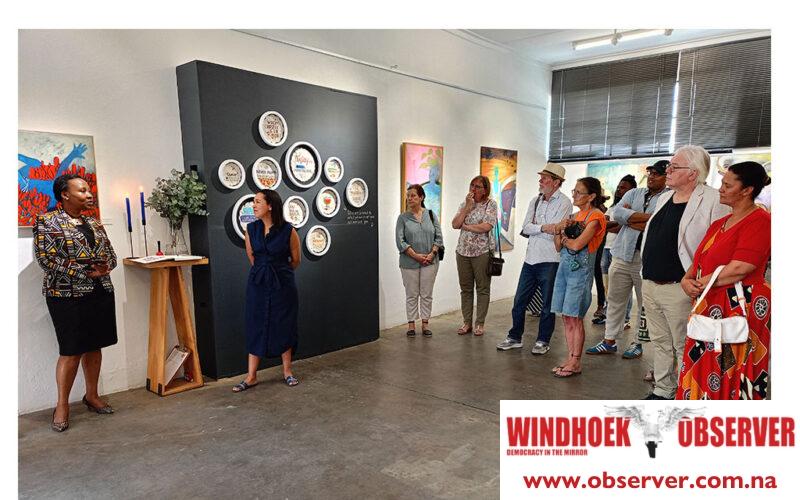Moses Magadza
An art exhibition themed, “So She Was Turned to a Pillar of Salt,” began in the Namibian capital Windhoek on Saturday, with renowned Namibian artist Jo Rogge being hailed for her transformative contributions to contemporary art and social justice.
The exhibition, which opened to an engaged audience of art enthusiasts, diplomats, and social activists, revolves around the complex relationship between memory, identity, and the evolution of society.
SADC Parliamentary Forum secretary general Boemo Sekgoma, was the keynote speaker at the launch.
“Art is the language through which we express the soul of humanity,” she said.
Drawing on the words of Nobel Laureate Saul Bellow, Sekgoma posited that art “penetrates what pride, passion, intelligence and habit erect on all sides,” inviting attendees to embrace the “genuine reality” often obscured by the noise of everyday life.
The exhibition’s theme encourages viewers to grapple with the tension between reflecting on the past and moving toward the future.
“We must remember that while we learn from our experiences, we cannot live there,” Sekgoma cautioned, adding, “True progress lies in forging ahead, unburdened by the ghosts of yesterday.”
Addressing the pressing issues affecting women around the world, Sekgoma stressed art’s powerful role in challenging outdated norms.
“Child marriages, female genital mutilation, and gender-based violence are not merely harmful cultural relics. These practices turn women into pillars of salt – frozen in time and denied the chance to move forward,” she argued.
She noted that through artistic expression, Rogge’s work aims to inspire change and give voice to the marginalised, invoking the need for society to reexamine and dismantle harmful traditions.
She also touched on the complexities of identity in relation to societal expectations.
“The conflicts surrounding the body, especially bodies in precarious positions, reveal a philosophical paradox of identity shaped by forces beyond our control,” Ms Sekgoma said.
Recognizing the experiences of diverse sexual orientations and gender identities, she noted that Rogge’s art creates a space for validation and exploration of these identities.
“In doing so, we resist the notion that people must be frozen in place and limited by outdated norms,” she asserted.
Highlighting the perils of inaction, Sekgoma highlighted the responsibility each individual bears in the fight against oppression.
“When we remain silent, we become complicit in perpetuating these harmful systems.”
Drawing from the words of Joseph Beuys, she underscored the importance of art as a catalyst for societal change.
“Art that cannot shape society… is no art.”
Sekgoma hailed Rogge for her commitment to art.
“Her artistic journey is one of deep reflection and interrogation of heritage, identity, and history,” she said.
Namibian political scientist and author André du Pisani attended the launch of the exhibition. In an interview, he shed light on the profound significance of Rogge’s work, noting its multifaceted impact on culture and society.
Having collaborated with Rogge since she arrived in Namibia during the 1980s, Du Pisani described her as a pivotal figure in arts education, stating, “Her role in arts education has been very formative. She has trained some very good artists.”
He said Rogge’s latest exhibition tackles pressing issues of identity and gender, presenting a tapestry of perspectives that challenge societal norms.
Du Pisani noted, “As an artist, she has defined her own identity. It’s very much about her identity. In that sense, it’s introspective.”
He said this introspection was rooted in a strong feminist ethos, with the artist embracing both radical and material feminist principles, enabling her to confront critical issues such as gender-based violence and the evolving roles of women in contemporary society.
Du Pisani elaborated on the broader implications of Rogge’s art.
He said: “She revisits what is happening to women more generally… She’s also political. She reflects on how society responds to these phenomena of unity and diversity.”
He added that Rogge’s art serves as a catalyst for discussion around identity construction and the complexity of self-definition within a diverse society.
The professor stressed the importance of knowledge construction in Rogge’s work, asserting, “That makes her an important artist, not only visually, but also in terms of the knowledge construction that her work carries.”
He said her ability to interweave artistic expression with feminist theory positions her as a critical voice in the contemporary art landscape.
Asked what he would want to see society gravitate towards considering Rogge’s work, Du Pisani articulated a vision for societal progress: “If you want social inclusivity and if you want to actualize the principles of equity, equality, and liberty, then you go into social democracy… How you deal with these different identities is an important question, not only politically but in knowledge.”
He held that Rogge’s art was instrumental in decolonizing narratives surrounding patriarchy and that it transcends mere aesthetic appeal, acting instead as a powerful commentary on identity, gender, and the quest for equality.
The exhibition runs up to 12 October.
*Moses Magadza is the Media and Communications Manager at the SADC Parliamentary Forum.




